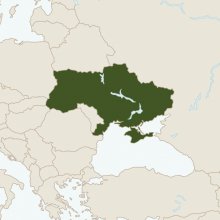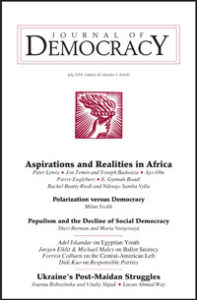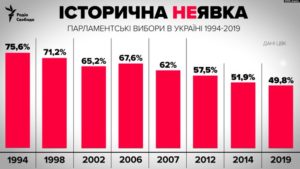
NDI
Now that President Volodymyr Zelenskiy’s new party, Servant of the People, has won a majority in Ukraine’s parliament, the potential for real change exists. But it comes with the risk that the government could lose sight of socioeconomic and political priorities, says Gwendolyn Sasse, a nonresident senior fellow at Carnegie:
The key question is whether such a radical turnover in one of Ukraine’s least-trusted political institutions will translate into effective legislative work to bolster the reform process and bring peace to Ukraine, as Zelenskiy has promised. It is an immense challenge that begs other questions. Will the lack of political experience in the new Rada hamper this process? And will vested interests and rivalries emerge and divert the reform process, as in previous political cycles?

Democratic Initiatives Ukraine
Five years after the EuroMaidan protests drove a corrupt president from power, how is Ukraine’s democracy faring? The NED’s Journal of Democracy asks.
There are anxieties about what an inexperienced president with undefined loyalties and policies will mean for Ukraine’s besieged, relatively young democracy, Joanna Rohozinska and Vitaliy Shpak* observe, laying out the factors leading to Zelensky’s surprise presidential victory:
 Much like Poroshenko before him, Zelensky has in many ways assumed the least-enviable office in the world. His biggest asset is his undeniable mandate. Bluster aside, it is unlikely that he expected to win the presidential race when he launched his campaign. And yet no previous Ukrainian president has won by such an overwhelming margin. Zelensky was propelled to victory by deep distrust of the political elite, disappointment over what voters see as unfulfilled promises, and emotional exhaustion with the ongoing war and economic hardship.
Much like Poroshenko before him, Zelensky has in many ways assumed the least-enviable office in the world. His biggest asset is his undeniable mandate. Bluster aside, it is unlikely that he expected to win the presidential race when he launched his campaign. And yet no previous Ukrainian president has won by such an overwhelming margin. Zelensky was propelled to victory by deep distrust of the political elite, disappointment over what voters see as unfulfilled promises, and emotional exhaustion with the ongoing war and economic hardship.
Happily, Ukrainians in the southeast have not abandoned the Ukrainian state but have instead done what voters are supposed to do in democracies: punish politicians who ignore them, adds Lucan Ahmad Way, professor of political science at the University of Toronto.
Zelensky, who speaks mostly Russian and made an active effort to court voters in the east, won the second round in a landslide, with support from a majority of voters in every province except Lviv in western Ukraine. Most encouraging, far more citizens in this part of Ukraine came to the polls than in 2014, he writes for the JOD:

Russia’s war with Ukraine has created legitimate security concerns that warrant some government censorship. Yet the best defense against Russian aggression is likely to come not from restrictions on media or bans on parties, but from citizens who feel that they have a stake in Ukraine and more to gain by participating in the political system than by supporting Russian efforts to divide the country.
Please join a special meeting of the Transatlantic Task Force on Elections and Civil Society in Ukraine focused on the outcome of the July 21 Ukrainian parliamentary elections: A Readout of Ukraine’s Parliamentary Election: What Comes Next in Kyiv?
Discussants
- Hanna Hopko, MP, Head of the Committee on Foreign Affairs, Verkhovna Rada of Ukraine (from Kyiv)
 Iryna Bekeshkina, Director, Ilko Kucheriv Democratic Initiatives Foundation (from Kyiv)
Iryna Bekeshkina, Director, Ilko Kucheriv Democratic Initiatives Foundation (from Kyiv)- Eugene Czolij, Head of the Ukrainian World Congress (UWC) International Observation Mission to Ukraine’s 2019 Elections (from Kyiv)
- Taras Shevchenko, Director, Center for Democracy and Rule of Law (from Kyiv)
- Andreas Umland, Senior Research Fellow, Institute for Euro-Atlantic Cooperation (Kyiv)
Wednesday, July 24, 2019 | 9:00 a.m. – 11:00 a.m.
The German Marshall Fund of the United States, 1744 R Street NW, Washington, DC.
*Joanna Rohozinska is senior program officer for Europe at the National Endowment for Democracy (NED). Vitaliy Shpak is program officer for Europe at NED.







